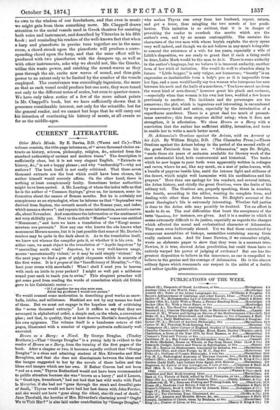CURRENT LITERATURE.
Other Men's Minds. By R Davies, D.D. (Warne and Co.)—This volume consists, the title-page informs us, of" seven thousand choice ex- tracts on history, science, philosophy, religion, &a., selected from the standard authorship of ancient and modern times." The description is sufficiently clear, but it is not very elegant English. "Extracts on history, &c.," is not a happy phrase ; and why "authorship"?—why not authors ? The book itself_ is not easily criticised. That these seven thousand extracts are the best which could have been chosen, the author himself would scarcely affirm. On the other hand, there is nothing at least conspicuously faulty. Sometimes better authorities might have been quoted. A Mr. Leering, of whom the index tells us that he is the author of "Common Sayings," gives us, for instance, some in- formation about the names of Roman months. But he is certainly not conspicuous as an etymologist, when he informs us that "September was derived from Septem, the seventh month of the Roman year, and imber, 'which means a shower"; and repeats the same information, ntutatis ntutan- des, about November. And sometimes the information or the sentiment is mot very skilfully put. Next to the article "Months "comes one entitled "Monument ;" and here we have a translation of the "Exegi monu- raentum are perennis." Now any one who knows the ode knows what monument Horace means, but it is just possible that some of Mr. Davies's readers may be quite in the dark about it. As to the translation itself, we know not whence the compiler gets it, or whether it is his own. In either case, we must object to the translation of " Aquilo impotens " by "unavailing north wind." impotent, by a very well-known usage, means 'unrestrainedly violent,' or it may be said simply violent.' On the next page we find a gem of pulpit eloquence which is scarcely of the first water. It is apropos of the "Insufficiency of Morality,"—" Go, heat your ovens with snowballs I What shall I send you to heaven with such an icicle in your pocket? I might as well put a millstone round your neck to teach you to swim." This eloquent preacher will get some good from reading the words of consolation which old Dibble gave to his Calvinistic rector :— " If I of pardon for my sins were sure,
About my goodness I would rest secure."
We would counsel some moderation in describing good works as snow- balls, icicles, and millstones. Mankind are not by any means too fond of them. But we must not engage in the hopeless task of criticising the "seven thousand extracts." Let it suffice to say that they are arranged in alphabetical order, a simple and, on the whole, a convenient plan ; and that, in quality, they at least deserve Martial's description of his own epigrams. The volume itself is a handsome octavo of 640 pages, illustrated with a number of vignette portraits sufficiently well executed.


































 Previous page
Previous page